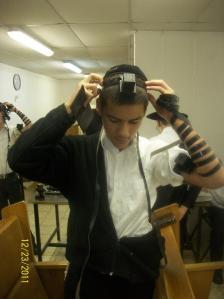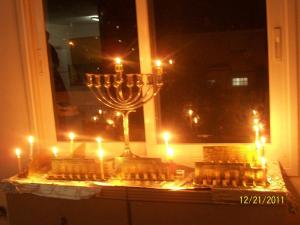I recently got a subscription to the easy Hebrew newspaper, Shaar L’matchil. It was supposed to arrive on Tuesday for the first time, but after repeated calls to the office, it arrived this morning instead. I was so glad to see it, until I opened it up and saw the first line of the front page article – “Recent events in Beit Shemesh have worsened the struggle between the secular and national religious parties – and the charedi public.”
This is so upsetting to me because it’s misleading and untrue. The issues in Beit Shemesh weren’t about anyone being against the charedim (religiously conservative Jews), but against the sickos who are perpetuating evil and saying they’re doing it because the Torah mandates it. Until this point, those involved in Beit Shemesh have been careful to say ‘the extremists’, specifically not ‘the charedim’ because all of those who live there realize this is an issue with an extreme group of people who have no conscience who don’t represent the general charedi public. But the secular media is having a heyday painting all religious Jews (ironically, even those who were in the group that was attacked by the extremists) as intolerant, dangerous religious fanatics who are planning to take over the country and force their sick moral codes on everyone else.
It’s 9 am and I’ve been awake for hours. I woke up in the middle of the night, trying to think about how to explain this situation here on my blog to a readership that is coming from vastly different backgrounds. It’s actually more of a topic for a thesis rather than a post, but I’ll try to be brief and include the most salient points (as I see it).
The state of Israel has been characterized by extreme struggles between the secular and religious from before it’s founding. This country was founded by those who were anti-religious to the extreme, and terrible things were done by these leaders (Operation Magic Carpet is one particularly horrendous widespread case that comes to mind) to eradicate religiousity. Understandably, an antipathy developed on both sides and an extreme religious divide developed.
Many of us have moved to Israel who don’t have that common history, and haven’t grown up with this as our reality, so it’s hard for us to understand how deep this runs. Those who have been living here for generations grew up with a much different reality, and it’s reflected in the way they interact with those they perceive to be on the other side. Meah Shearim is the oldest neighborhood in Jerusalem (outside of the Old City) that was established by very religious Jews. It was filled with pious Jews of similar values, and has remained this way until now.
However, what was a physically isolated neighborhood when it began became part of the city center as the city grew. It is seen as a quaint and historic area, and is a popular tourist destination. However, the people living there never asked to be put on display and have people from very different walks of life come through their neighborhood. Many years ago, they put up a large sign upon entry to their neighborhood, requesting that visitors show respect to those living there by dressing modestly when visiting – not according to their stringent standards, but for women to cover their necklines, knees, and elbows. Some people respect this, many others take pictures with this sign, and others provocatively enter this area dressed very inappropriately, with the intent to show that they won’t endure religious coercion.
So what happens in an area where respectfully trying to ask others to respect you isn’t respected? Some people became more aggressive over time about this, too aggressive, way too aggressive. And since these people were seen as fighting for Torah values (and things started much smaller), they weren’t stopped early on, when it might have been nipped in the bud. So the message that aggression works was adopted by some as a way to fight for their values. It was from this neighborhood that a number of families moved to Beit Shemesh years ago, thinking to recreate the lifestyle they had enjoyed there. There was just one problem – they were moving into a community that had been there for many years.
Now, if they were able to adapt a ‘live and let live’ attitude, there wouldn’t be any news today. And actually, many of the people do have that attitude. But unfortunately a number of people weren’t content to enjoy their new more spacious surroundings. As their neighborhood grew, it got closer and closer to the existing religious but more modern communities who had been there for many years. And this is where the tensions began, as they tried to insist on their religious mores for everyone around them.
This went way beyond sharing Torah thoughts with their new neighbors (which is what the rabbi who sent them there to live said he expected them to do) – they began using fear and intimidation to get what they wanted. When a religious woman in her fifties was sitting in the front of a public bus (this was about five years ago), she was beaten by a group of these hoodlums when she refused to move to the back. Back then, I was so distressed and asked, “How are people allowing this? Why aren’t people stopping them?”
I think there are two reasons: a) people who saw the danger for what it was, and were afraid. Seriously, would you keep sitting in the front of a bus if you risked being beaten up? (I did sit in the front of the bus when I visited Ramat Beit Shemesh a few months ago, and was a little apprehensive about it for this reason.) b) Most charedi Jews who saw this viewed them as a group of radicals who weren’t connected to them, and saw it as incumbent on the group’s leadership to moderate it’s followers. It was so clear to them that these actions were against the Torah, and that they couldn’t possibly advocate or approve of this, that it seemed unnecessary to state it. And c) some people didn’t approve of the means, but did agree with the end goals, and were willing to turn a blind eye to methods used to get to those goals.
Now, you might be saying, but where are the rabbis? Why don’t they stop them? I’ve had the same questions. I think these people shouldn’t be given an aliyah in shul (called up to make a blessing on the Torah in synagogue), and whatever social pressures that are brought to bear on someone who hasn’t given his wife a get (religious divorce) should be put on them. This has to come from their community to be effective, though. And they don’t have any rabbi that they follow, nor anyone whose directives they would listen to. They make their own rules, they don’t care about anyone – they could care less that they are causing a huge desecration of G-d’s name internationally. They could care less about the hatred that is being caused between Jews because of them. They truly don’t care. They are sick, abusive people, and unfortunately for us all, they are claiming to act in the name of the Torah to perpetuate their evil.
In my opinion, when you deal with abusive people, you have to fight might with might. I know that doesn’t sound so nice, but I don’t think anything else works with people like this. You have to show you’re stronger than they are. Now that the media is involved, the police have finally taken action, like they should have been doing for months. I saw a video months ago, where parents were asking the police to protect their daughters as the men were screaming at the young children exiting their school, and were told until there was a physical attack, they couldn’t do anything. I also believe the mayor of this city is at fault, for empowering these evil people by letting them get away with this for so long. He could have instructed the police to take action months – years – ago. He didn’t.
But honestly, there are always going to be sick people in the world, and it’s not fair to place all of the blame for their behavior on the people around them. So I don’t think this can all be laid at the feet of others, but directly on those who do the actions themselves.
It looks like now, some people have been embarrassed into taking action. That’s a good thing. But what’s not a good thing is dragging an entire religious group through the mud, a population that has an extremely low criminal rate, that has an unusually high rate of family stability – for the sake of political gain (locally and internationally), and that’s what’s now happening.
Avivah




